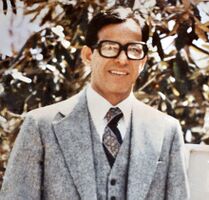Lal Mani Joshi
Joshi, L.
| PersonType | Category:Authors of English Works Category:Editors Category:Professors Category:Translators |
|---|---|
| FirstName / namefirst | Lal Mani |
| LastName / namelast | Joshi |
| MainNamePhon | Lal Mani Joshi |
| SortName | Joshi, Lal Mani |
| bio | Professor Joshi was born on July 27, 1935, in a traditional Brahmin family in the Almora district of the Kumaon hills of Uttar Pradesh, near the ancient pilgrim route to Mt. Kailash. He was proud of the fact that his birth was in July of 1935, only a few weeks after H.H. the XlVth Dalai Lama was born, which he used to say was an "omen" of their shared concern for the spread of appreciation of Buddhism in the world. As a young man he had strong spiritual inclinations, and a favorite story he liked to tell was how his parents were worried at one point that he might become a Sadhu, so intensely did he spend time meditating in the small but famous Yoga Ashramas in the Almora area. . . .
In the late fifties he received his M.A. in Pali from Banaras Hindu University and, as well as his Ph.D., another M.A. in Ancient History and Culture from Gorakhpur University. His doctorate dissertation was on "Buddhistic Culture of India during the 7th and 8th Centuries." He started his career as Assistant Professor in the Department of Ancient Indian History and Culture at Gorakhpur University from 1961 to 1967. He went on to join the Guru Gobind Singh Department of Religious Studies at Punjabi University, Patiala, becoming a key figure in that thriving center of the study of world religions. He was made Dean of Faculty of Religious Studies, in 1980-81. His international reputation rose steadily as he ably edited the Journal of Religious Studies, and his milestone work in Indian religious history, Studies in the Buddhistic Culture of India (Delhi, 1967), was more and more widely acclaimed. Another major project of his, with Bhikkhu Pasadika, was the translation of the Arya-vimalakirti-nirdesa-sutra into Hindi (Sarnath, 1981). Other publications include Dhammapada, Pali Text in Gurmukhi Script (Patiala, 1969); Brahmanism, Buddhism and Hinduism (Kandy, 1970); An Introduction to Indian Religions (Patiala, 1970); Vajracchedika Prajñāpāramitā with the commentary of Asaṅga and its translation in Hindi (Sarnath, 1978); Facets of Jain Religiousness in Comparative Light (Ahmedabad, 1981); and a chapter on "The Monastic Contribution to Buddhist Art and Architecture" in The World of Buddhism edited by Heinz Bechert and Richard Gombrich (London, 1983). He attended many international conferences, in Sri Lanka, Burma, Thailand, Malaysia, Taiwan, Korea, Japan, Russia, Europe, and the United States, as well as all over India. He was a member of the editorial board of our JIABS, as well as a member of the Board of Directors of the IABS. He was a valued member of the Board of Advisers of the American Institute of Buddhist Studies at Amherst College in Amherst, Massachusetts, USA. (Extracted from Prof. Lal Mani Joshi's obituary by N. H. Samtani and Robert Thurman, JIABS Vol. 8, no, 1, 1985) |
| YearBirth | 1935/07/27 |
| YearDeath | June 1984 |
| BornIn | Almora district of the Kumaon hills, Uttar Pradesh |
| affiliation | Punjabi University |
| phduniversity | Gorakhpur University |
| education |
|
| IsInGyatsa | No |
| Other wikis |
If the page does not yet exist on the remote wiki, you can paste the tag |

